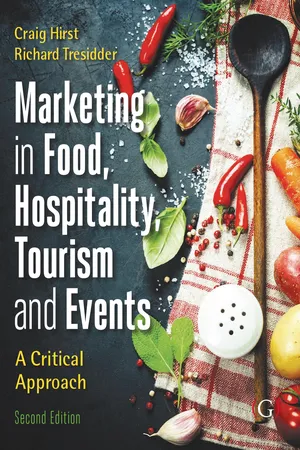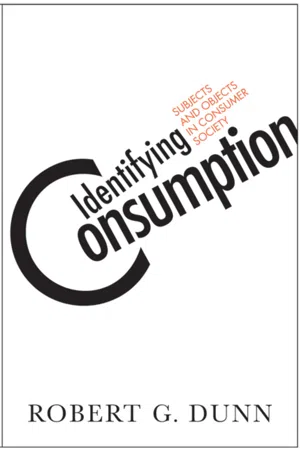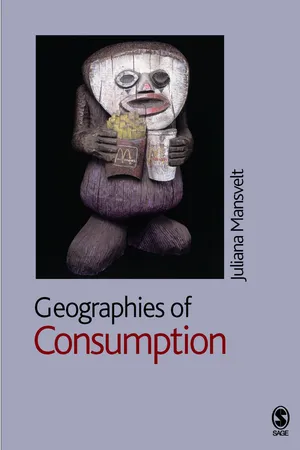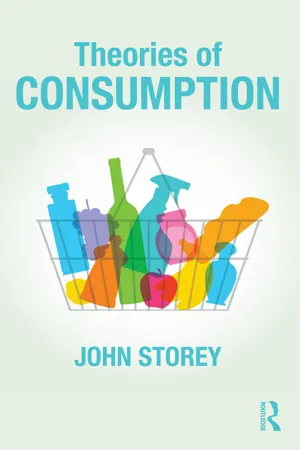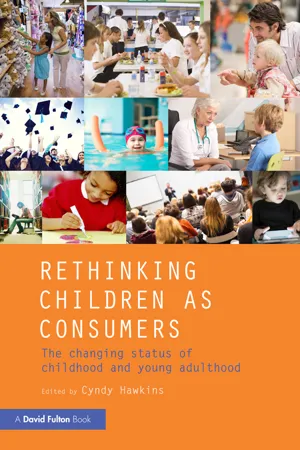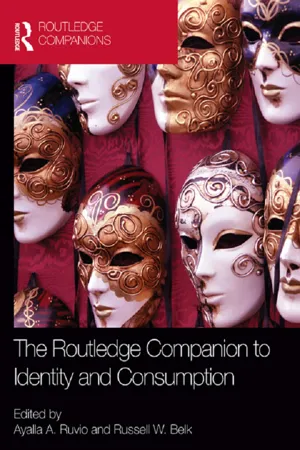Social Sciences
Consumption Identity
Consumption identity refers to the way individuals express their sense of self and belonging through their consumption choices. It encompasses the products, brands, and experiences people choose to associate with, which can reflect their values, aspirations, and social status. This concept is often studied in the context of consumer behavior and cultural studies to understand the role of consumption in shaping personal and social identities.
Written by Perlego with AI-assistance
Related key terms
1 of 5
11 Key excerpts on "Consumption Identity"
- eBook - PDF
Marketing Tourism, Events and Food 2nd edition
A customer based approach
- Craig Hirst, Richard Tresidder(Authors)
- 2016(Publication Date)
- Goodfellow Publishers(Publisher)
Marketing in Tourism, Hospitality, Events and Food 146 As such, consumption becomes a source of identity (Miles 1996), and on a daily basis consumers negotiate the symbols of consumer culture choosing which elements they engage with and in. The things we consume become a means of forming our identity, thus the decision to purchase a designer suit or dress often has nothing to do with the quality of the item, but has more to do with the message it sends to our peers about our knowledge of fashion, our ambitions and our taste. It becomes a badge or code of who we are, and is read by other consumers who then make assumptions about the type of person we are. Thus, consumption is essentially a social activity that incorporates meanings within the culture in which we live, and consumers skill-fully use goods to: …communicate, mark and classify social relations, it is a way of communicating individual taste, status, aspiration and even protest (Izberk-Bilgin, 2010:307). This reinforces Holt’s view: …that the pursuit of individuality through consumption is a central characteristic of advanced capitalist societies (1998:13). What is important to re-state here is that although at first sight the relationship between consumption and identity can be seen as super-ficial, it provides the freedom to create and shape an identity we want rather than having one imposed upon us by society. As Miles states: …the evidence suggests that consumption performs the role of solidifying an individual’s identity. In the context of cultural ramifications of peer relations amongst you people (sic), identi-ties in a so called ‘postmodern’ world might well be argued to be far more stable than many commentators would be prepared to admit. - eBook - PDF
Identifying Consumption
Subjects and Objects in Consumer Society
- Robert G. Dunn(Author)
- 2008(Publication Date)
- Temple University Press(Publisher)
Broadly speaking, codified and individuated modes of consumption-based identity formation could be thought of as involving different types of consumers. In the most fundamental sense, we would consider someone who defines self and other exclusively through con-sumption to be a different type than one for whom consumption in general seemed relatively unimportant in relation to identity. But for those for whom consumption makes a difference, most likely the ma-jority of the population, identifications made within each mode will type a person, in the commodity/sign mode mainly on the basis of im-age appropriation and in the other mode through self-based definitions and practices of a more individualizing and putatively authentic na-ture. The discussion thus far has drawn attention to the distinction be-tween self-identity, or how one perceives and defines self, and socially 178 ▪ Chapter 5 attributed identity, or how one is perceived and defined by others. Self-definition and other-definition are the two major facets of identity formation, together providing an overall analytical frame for outlining specific connections between consumption and identity. Identity formation can be conceptualized in three major dimen-sions. First, there is what we can call personal identity, which refers to a unique configuration of personal traits. This is represented by out-ward identifying characteristics that are both physical (the body, clothing) and behavioral (personality). These embodiments of identity are objects of self-stylization as well as others’ perceptions and defini-tions. Another component of personal identity can be a part of self-definition but is predicated more on the perceptions and judg-ments of others, namely “character,” or how we assess a person’s moral or ethical worth. Second, and this has been the focus of much of the foregoing dis-cussion, there is what we can call social identity. - eBook - PDF
- John Horne(Author)
- 2017(Publication Date)
- Red Globe Press(Publisher)
Rather than treating it as an analytical concept alone it is necessary to see it as a political one. This makes it another essentially contested term. Identities and Consumption The new conception of identity that has emerged in sociology in the past fifteen years views identity as an ongoing project. Previously the self was either considered as ‘a fully centred, unified individual, endowed with the capacities of reason, consciousness and action’ or someone ‘formed in relation to “signi-ficant others” ’ through interaction between self and society (Hall 1992b, pp. 275–276). Now the subject, rather than ‘having a unified and stable identity, is becoming fragmented; composed not of a single, but of several, sometimes contradictory or unresolved identities’ (Hall 1992b, pp. 275–276). This is what Stuart Hall called ‘the post-modern subject’ in which identity becomes more of a ‘ “moveable feast”: formed and transformed continuously in relation to the ways we are represented or addressed in the cultural systems which surround us’ (Hall 1992b, pp. 275–276). Identities are constructed but questions remain about how, from what, by whom and for what purposes? At its simplest we can say that identity refers to how we see ourselves in relation to others. In this respect identity is about similarities and differences – drawing distinctions between ‘us’ and ‘them’. Bechhofer et al. (1999), for example, argue that we should think of any individual’s sense of national identity as not fixed but as constructed and sustained by the mundane realities of everyday life. Hence the national identity that anyone will claim to have will vary according to his or her spatial and temporal location. It also depends upon how others perceive those claims. Bechhofer et al. carried out interviews with members of the landed and arts elites in Scotland and people who lived in Berwick-on-Tweed, a small town closest to the border between England and Scotland. - eBook - ePub
- Juliana Mansvelt(Author)
- 2005(Publication Date)
- SAGE Publications Ltd(Publisher)
Chapter 2 ). Mackay (1997) indicates there are two ways of conceptualizing relationships between consumption and identity: consuming to become, and consuming according to who we are.We consume to become who we are?
In this schema individuals create, affirm and contest social identities through consumption practices. Taken to the extreme, this perspective is usually associated with the purchase of commodities and is enshrined in notions of ‘lifestyle shopping’ (Shields, 1992a) where individual consumption is predicated on acquiring the qualities and identities associated with commodities and particular consuming practices. Such a view draws on Baudrillard’s (1981; 1988) writings, in which consumers disappear in an overwhelming commodity world of signs and simulations, and consumption becomes an end product of consumer manipulation, need and utility. As Goss explains, ‘It seems we are all consumers now. But perhaps we are not even really that, and have ourselves become objects of consumption’ (1999a: 114–15). Consumer identities and practices are thus sold as products and objects which may possess subjects through their characteristics. Rowlands argues that this has occurred in Cameroon, for example, where Western commodities have ‘become the touchstone for the production of selfhood’ (1994: 150).A view of individuals as consumers who are engaged in the construction of self by purchasing commodities which will provide distinction results in a somewhat superficial and one-sided view of consuming subjects (Falk and Campbell, 1997). People are reduced to shoppers, consumers and performers of ‘social identities’, neglecting the spatiality and relatedness of experiential bodily practices and processes of cognitive self-reflexivity. Yet this ‘relatedness’ may be critical in choices not to buy or to consume, for example, decisions about whether a commodity is for me, imagining whether one is or could be ‘like that?’ (Falk and Campbell, 1997). - eBook - ePub
- John Storey(Author)
- 2017(Publication Date)
- Routledge(Publisher)
7Consumption and IdentitiesIn this chapter I discuss ways of thinking about the relationship between consumption and identity. This will include a critical assessment of Judith Butler’s theory of performativity, and accounts of both ‘displaced meaning’ and the historical role played by the department store in the process of learning to make identities in social practices of consumption. What these accounts have in common is that they all see consumption as fundamental to the production of identity.We are what we consume
When we meet someone for the first time, in order to get to know the kind of person they are, we ask certain questions. An obvious question is what kind of work they do. But sooner or later, in order to get to know them better, we will ask questions about matters of consumption. What books do they read? What films do they like? Do they have favourite television programmes? To what kinds of music do they listen? Which football team do they support? These, and many more like them, are all questions that connect consumption with questions of identity. On knowing the answer to enough of these questions, we feel able to construct a cultural and social pattern and thus to begin to locate the person in a particular cultural and social space – we begin, in other words, to think we know who they are.Traditionally, identity has usually been understood as something coherent and fixed; an essential quality of a person that is guaranteed by nature, especially human biology (‘human nature’). This traditional view is sometimes modified to produce a second view of identity in which it is still something fixed and determined, but in this formulation biology is said to combine with social variables such as class, ‘race’, ethnicity, or gender, to produce and guarantee (what is still) a coherent and fixed identity. Over the course of the nineteenth century and the early part of the twentieth a number of major intellectual assaults were made on this way of seeing identity, each in its different way making a successful challenge to the idea of a fixed and coherent self. In different ways, Charles Darwin’s theory of evolution (the evolving self ), Karl Marx’s concept of history (the historical self ), Sigmund Freud’s theory of psychoanalysis (the unconscious self ) and Ferdinand de Saussure’s theory of language (the self-enabled and constrained in and through language) all helped to ‘decentre’ the traditional self. - eBook - ePub
Rethinking Children as Consumers
The changing status of childhood and young adulthood
- Cyndy Hawkins(Author)
- 2016(Publication Date)
- Routledge(Publisher)
Chapter 7 Consumption, identity and young people Mark WeinsteinIntroduction: consumer society
To borrow from one of the greatest opening lines in English literature, it is a truth universally acknowledged that we now live in a consumer society (Austen, 1992). However, that is where the universality ends and the contention begins. Questions concerning the precise shape of this consumer society, its impact on our lives, our identities and relationships, our power and place in society are as fiercely debated today as they have been at any time since the explosion of modern consumer society in the postwar period (Osgerby, 1997). While the development of consumer society is commonly traced back to the industrial revolution of the late nineteenth century, modern consumerism is more commonly seen as a feature of the post-industrial society of the late twentieth century (Sassatelli, 2007). Moreover, interconnected processes at the heart of globalisation now mean that we live in an age where powerful transnational cultural corporations seek to shape consumption for a global market (Nederveen Pieterse, 2004).Central to debates around consumer society are questions concerning the extent to which our identity, our own subjective interpretation of how we see ourselves within society, now derives primarily from our consumption practices. As the economies of the advanced industrial capitalist world have moved away from their industrial base and have become increasingly founded on retail, services and consumption (Lash and Urry, 1987), it is now argued that where once people would derive identity through their role as workers, as members of a social class, a religion or through an ethnicity or community, they now define themselves through consumption-based identities. What we eat and wear, the cars that we drive, the music that we listen to and the holidays that we take allegedly now communicate more about ourselves than the structural collectivist traditions of the past (Paterson, 2006). - eBook - PDF
Economic Geographies
Circuits, Flows and Spaces
- Ray Hudson(Author)
- 2005(Publication Date)
- SAGE Publications Ltd(Publisher)
In due course, the consumption norms of the middle classes cascaded down to the 180 ECONOMIC GEOGRAPHIES working classes, seeking to emulate the former, who in turn sought out new forms of commodity consumption. In contrast, a century later emulation no longer has the same influence. Dress styles in late modernity are much more personality-specific than specific to social positions. Thus they involve an important set of identity choices and identity risks, especially for young people. These often involve creating multiple identities. Thus, for example, through dressing up, consuming clothing and presenting the body in particular ways, through wearing and using appropriate consumer goods, often as part of tribes within the throng, new identities can be identified, experimented with, and explored (Glennie and Thrift, 1996b, 236). More generally, ‘playing’ with commodities and experimenting with new styles and identities requires a social setting and the reactions of others to guide choices. However, there is great socio-spatial selectivity in terms of who can participate in such explorations of the self. While it may be possible for more affluent people in more affluent parts of the world, it is debatable as to its validity beyond those bounds. Food consumption may also be critical in relation to identity formation. Referring to decisions as to what to eat, Whatmore (1995, 36) suggests that ‘the prevalent representation of such experiences as the mark of “consumer choice” belies a diminished understanding of and control over what it is we are eating and the social conditions under which it is produced’. There is, therefore an ‘intimate and unavoidable connection’ between the food system, retailing and the consuming body (Crewe, 2001, 630), which is at best partially understood by many consumers of food products. - Ayalla A. Ruvio, Russell Belk, Ayalla A. Ruvio, Russell W. Belk, Ayalla Ruvio, Russell Belk, Ayalla A. Ruvio, Russell W. Belk(Authors)
- 2013(Publication Date)
- Routledge(Publisher)
Exploring and Conceptualising the Interrelationships Between Self and Possessions Through Hong Kong Chinese Consumers’ Narratives . PhD, Lancaster University.- Wong, P., Hogg, M.K. and Vanharanta, M. (forthcoming) “Consumption Narratives of Extended Possessions and the Extended Self.” Journal of Marketing Management .
- Yang, K.S. (1995) “Chinese Social Orientation: An Integrative Analysis.” In T.Y. Lin, W.S. Tseng and E.K. Yeh (eds), Chinese Societies and Mental Health . Hong Kong: Oxford University Press.
Passage contains an image
I.IV Stigma, sacrifice, and self
DOI: 10.4324/9780203105337-15Passage contains an image
11 STIGMA, IDENTITY, AND CONSUMPTION
Özlem Sandıkcı and Güliz Ger DOI: 10.4324/9780203105337-16Despite all the 21st-century rhetoric of diversity, most people expect and desire some normalcy – however that is defined by their milieu. If a person is to deviate from what is considered to be “normal” at a particular point in time and place, s/he is likely to face some consequences. Then, if consumption is fundamentally linked to identity, how identities are received and assessed by others will have wide-reaching implications for the ways individuals consume. Identity is not simply a personal thing; it is valorized differentially by various collectivities and refracts back to the practices of the individual. An individual will consume in a manner that will serve to shift the experienced socio-cultural valorization, to make it more positive, accepted, appropriate, or normal, at least among a particular collectivity, or consume in a manner to protest the particular valorization, or both. As consumption serves to objectify relationships (Miller 1987- eBook - PDF
The Transformation of Cities
Urban Theory and Urban Life
- David C. Thorns(Author)
- 2017(Publication Date)
- Red Globe Press(Publisher)
What this adds to our previous discussion is attention to the way that what we consume serves as a mark of distinction. The link between consump-tion and style and status has long been established. The work of Weber (1921), and later Veblen (1934), drew attention to these dimensions of social differentiation as conceptually independent of class (economically-based) distinctions. Social closure, around activities and attributes that endow people with prestige and status, points to what we consume and also the identities we express and seek. Consumption, therefore, raises a series of quite complex questions for analysis and links into the debate about postmodernity that we have previously discussed. In respect to urban life, consumption activities have assumed greater significance as the size of the urban realm has increased and because of the shift of activity from production to consumption. Broadly, the analysis of consumption has been either within political economy or relied on cultural psychology and sociology. The latter has given greater significance to the development of distinctive consumer cultures and a greater degree of agency to the indi-vidual consumers and how, through consuming, they craft their sense of identity. Consumption and Urban Culture 121 Collective Consumption Urban studies in the 1970s are strongly influenced by political economy and the debate about urban consumption was centred on the transition from Fordist ‘mass consumption’ towards a more flexible system of com-modity production arising out of the crises in western capitalism necessi-tating the restructuring of economies to return them to profitability. Here, work was initially stimulated by the research in the 1970s of Castells (1976) into the restructuring of state provision away from ‘collective consump-tion’ towards increased levels of private, individual provision. From this, he developed his focus upon collective consumption goods. - eBook - PDF
- Kay Anderson, Mona Domosh, Steve Pile, Nigel Thrift, Kay Anderson, Mona Domosh, Steve Pile, Nigel Thrift(Authors)
- 2002(Publication Date)
- SAGE Publications Ltd(Publisher)
Key aspects of consumption such as food, housing and dress are determined not by individual choice but by custom and ascribed status. Moder-nity is then associated with something like an institutionalized identity crisis in status orders; people’s positions within them and ways of sig-nifying those positions through lifestyles are all rendered unstable. Giddens (1991), for example, points to features such as methodical doubt of all authority and knowledge, the plurality of life-worlds that individuals must negotiate in their daily lives, the increasing mediation of possible lifestyles as conveyed through public representa-tions, and the absence of fixed and ascribed iden-tities. In such conditions, as Giddens puts it, ‘We have no choice but to choose’ (1991: 81). Indeed, as a requirement of modern social life we have to forge identities through the production of ‘reflexive narratives of the self’, the constitution of coherent identities by all means available. These include the patterns of consumption that are provisionally fixed into relatively stable ‘lifestyles’ and public represen-tations of lifestyles (by individuals, public authorities and media representations, including advertising). Unsurprisingly, this instability of meaning, identity and consumption is associated with heightened anxiety over consumption choices which – as choices – are both problematic and yet read as profoundly expressive of a choosing self: we do not know what choices are ‘right’, but we know that any choice will be interpreted as a moral comment on who we think we are (but see also Warde, 1994a; 1994b). For example, a great deal of research focuses on what Featherstone (1991) describes as the production of an ‘outer body’ or appearance through bodily regimes such as dieting, exercise and cosmetic transfor-mation, including surgery (see also Finkelstein, 1991). - Ann Brooks(Author)
- 2014(Publication Date)
- Bloomsbury Academic(Publisher)
supporting the Youth Olympic Games in Singapore in 2010 and the Olympic Games in London in 2012. Its menus and approach is still closely observed by the media and health and environmental groups. So, in summary: CULTURAL CONSUMPTION AND CULTURAL IDENTITY 31 Consumption is ideological and can be associated with branding, consumer 1. choice and human agency. Consumption is about lifestyle as well as product, hence the association in 2. advertising between branding and lifestyle. This can apply to those with limited powers of consumption, such as 3. youth, as in the Coca-Cola advertisements or to those with more resources where the brand has become an aspect of discriminatory consumption and iconic imagery, e.g. Apple or the designs of Philip Starck. Consumption applied to services and lifestyle is a more recent phenom-4. enon, and is now global. It was traditionally associated with the West but is now as applicable to Russia, China and India. The Frankfurt School provided a critique of popular culture on an ideo-5. logical basis maintaining that the culture industry created false needs among the working class. Their view of theory was that it a ‘critical theory’ which suggested resist-6. ance to dominant cultural hegemony conveyed by the dominant class, and provided resistance to commodity fetishism. By contrast, the CCCS shifted the emphasis to resistance from an emphasis 7. on domination. They focused on an emphasis on agency through ethnographic research 8. rather than passivity. They developed a way of presenting sites of struggle for social practices 9. and cultural meanings. Other more recent writers like George Ritzer show how the domination of 10. brands like McDonald’s can be contested. Overall the negativism of the Frankfurt School was useful at a time when 11.
Index pages curate the most relevant extracts from our library of academic textbooks. They’ve been created using an in-house natural language model (NLM), each adding context and meaning to key research topics.
